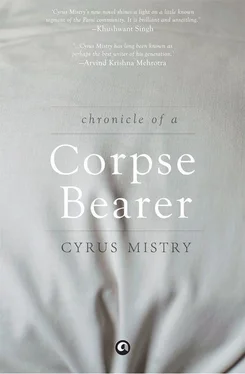Hilla, my mother, always had a soft spot for animals: to care for those dumb creatures who never complained about their personal woes seemed to her a worthy, ennobling activity. Over the years, she had accumulated a small menagerie of pets, housing them in the temple’s small backyard: a goat, who gave us milk every morning, a dourly enigmatic tortoise who could stride about with astonishing celerity when he wished to, two frisky adopted strays who loved to render him inactive by knocking him onto his shell (for no apparent reason), and an African grey parrot, Hormaz, who had belonged to Hilla’s father before her, and was estimated to be at least eighty years of age.
At various times she also tried rearing rabbits, squirrels and hens, though somehow, the latter were always very short-lived. The brief melancholy occasioned by the death of one of these minor pets (and its subsequent burial in the backyard), was a recurrent and heart-sinking motif that sounded like the temple bell through my childhood, and one of the few intense emotions I regularly shared with Mother.

Alone among the pets, the parrot’s favoured status allowed him space within our cramped living quarters, where a tall wooden stool served as pedestal for his impressive brass cage. Most of the time, however, Hormaz loathed being caged. He preferred to flap around our two rooms, or sat perched atop the dome of his cage, from where he would fix a sharply hooked gaze on the mundane preoccupations of humans. Only at dusk, when it was his bedtime, would he quietly strut back into the barred enclosure and, without warning, commence an outraged squawking to remind Hilla of the hour, that it was time to cloak his cage with the patched and musty blanket reserved for this purpose, without which, apparently, Hormaz couldn’t find it in him to fall sleep.
Framroze’s own bedtime wasn’t much later, though he was less impatient, and needed no more than a light supper to go out like a light. By 8 p.m. he was snoring loudly. The others stayed up until later. Sometimes, Vispy had homework to complete, and Hilla, her household chores. But the entire family was always considerate about not disturbing the exhausted high priest’s sleep. They knew he had set his alarm at forty-five minutes past midnight, so that at one o’clock in the morning, for the fifth and last time before daybreak, he would rise and re-enter the temple’s marble sanctum sanctorum to sweep up the excess embers and ash from the big fire vase, feed the fire with sandal and fan it back to life; then finally, at that desolate hour, ring several times the sonorous brass bell that hung from the ceiling inside the tiny square chamber.
Having thus marked the division of the day into the last of its five segments, Framroze would return to bed; that is, until 4.30 a.m., when he got up again to perform his ablutions, mumble his prayers and resonantly chime in the new morning. Shortly after, Hilla got up and began preparing the leavened breads, the sticky brown sweet with nuts and raisins which children love, the doughnuts, boiled eggs and crisply fried paapri. All of this was placed alongside fruits and a few buds of white flowers in trays of German silver, to make up the offerings which would be sanctified during a clutch of prayer services that began as early as 6 a.m. but concluded just before noon.
Framroze’s rubbery, porpoise-like frame was always to be seen lumbering hurriedly through the cool, tranquil inner halls of the Zoroastrian temple; that is, when he wasn’t seated cross-legged on the floor, taking part in some prayer service himself. His odd hours of waking and sleeping may have partly explained his perpetual air of dopiness, though even this was probably an inaccurate perception. In fact, he was a very busy man, attending politely not only to those who came to his temple to requisition prayers for their deceased, but also arranging for other freelance priests to fulfil some of these commissions at pre-arranged hours.
Moreover, he had to maintain a small notebook, in which he carefully noted the names of the deceased persons and all their relatives and ancestors whose names must be mentioned in the course of the recitation. He had to remember to give these names on a slip of paper to the officiating priest (or his junior partner) who would be performing the recitation. Often, subsequent to a flurry of ceremonies held during the first month after the occurrence of death, most relatives made it a point to have these and diverse other ceremonies repeated every month on the same day, sometimes for as many as twelve years.
So there was a large amount of paperwork involved in all this for Framroze — recording, scheduling, billing. Each ceremony cost the deceased relatives a certain modest, but specific amount. Only a portion of this amount went to the officiating priest. The rest of it covered the costs of various oblational offerings that were consecrated by the sonorous recitation of ancient Avestan hymns. Then, neatly packaged in paper parcels, the blessed fruit and bread were shared among the relatives of the family that had requisitioned the ceremony.
Besides all that, of course, someone had to take responsibility for ensuring a regular supply of fresh flowers and fruits for the services, and other comestibles for the resident priest’s family. Fortunately, there were florists and fruit and vegetable vendors who stopped by in the evenings, when the temple was at its most serene. Ardesar, my father’s assistant, himself a junior priest, or even Hilla, usually managed to secure bulk bargains for these products, and fix a date for the next delivery.
Often, Framroze had very little time for Hilla. I suppose this is what she must have meant by his selfishness. Days would pass without his enquiring after Vispy’s progress at school, and it was Hilla who held the fort, as it were, ensuring that a fresh school uniform was washed and ironed every day, that his homework was completed the evening before and his dry lunch ready and packed in his tiffin box every morning; that the family’s meals were cooked after Vispy left for school, that our tiny quarters were always spotlessly clean.
While they attempted to keep this complex domestic routine under control, for quite a while apparently, without knowing it myself, I had made my parents very anxious — by refusing to speak. My eyes shone, possibly, with some spark of intelligence, and occasionally I bestowed upon some member of my family the most endearing smile. But talk I wouldn’t, nor even, like babies do, blow spittle or burble meaninglessly. I was already three, and they had begun to worry that I was a little backward, if not actually feeble-minded; well, certainly not as bright as my elder brother — of that there was no question.
However, all of a sudden, I capsized their disparaging beliefs. One day, I finally did say something — a recognizable word! My first word, though, was not Mama, or Papa, or Vispy. Rather, it was something that sounded like ‘muss-muss’. It took Hilla a while to decipher, until she observed that I was trying to attract the attention of the parrot, Hormaz.
When Hilla reported the incident to him that evening, Framroze was thrilled.
‘The first word that escapes his lips,’ he pronounced solemnly, ‘is the name of the Almighty Creator. I have always known that wonderful things are in store for this boy. He may have had a tardy start but, perhaps, Hilla, one day our Phiroze will become a great priest, or a renowned Zoroastrian scholar.’
But my interest in the parrot came to an abrupt and chilling end. My mother at least, I believe, was never able to forgive me for what I did. To the others, it only seemed to confirm what they had always suspected: that I was a dull and pig-headed child.
Читать дальше













